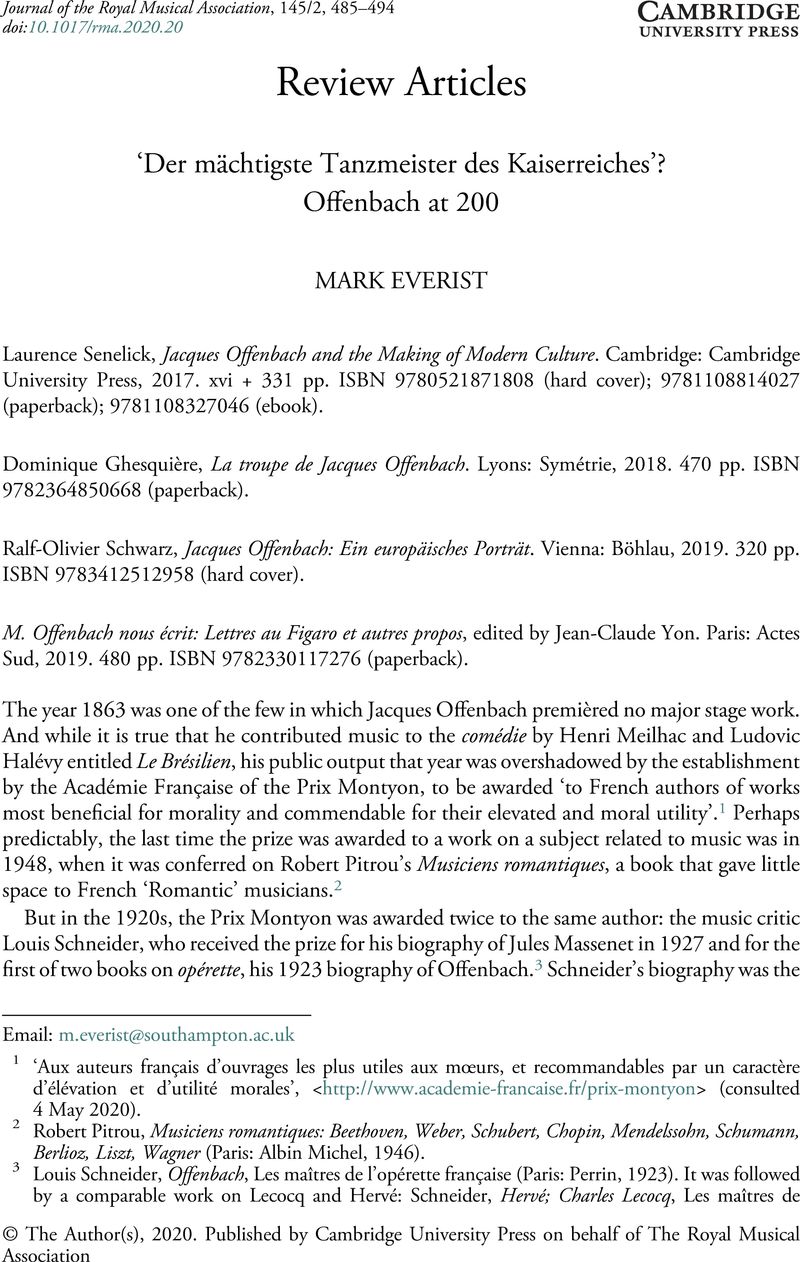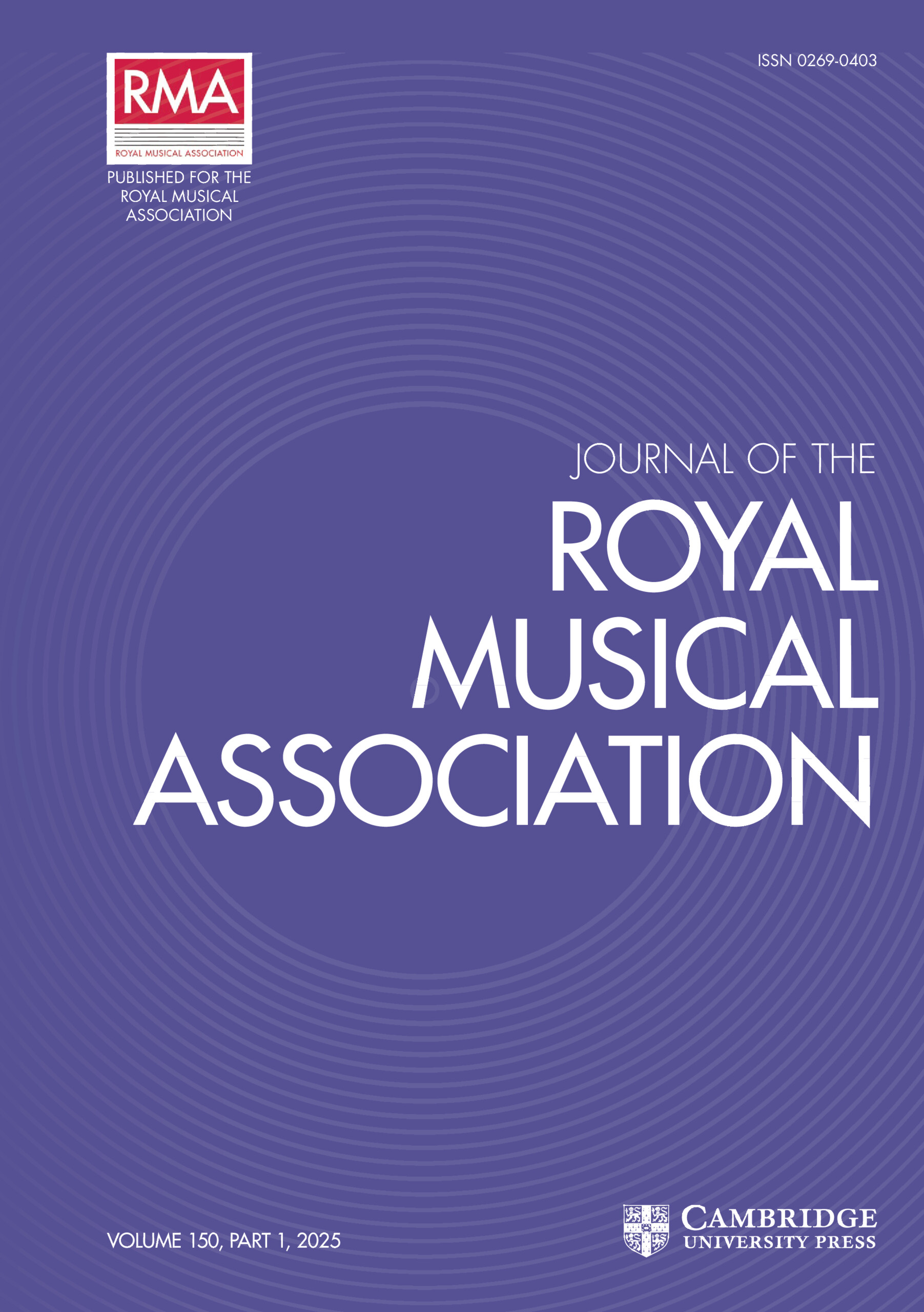No CrossRef data available.
Article contents
‘Der mächtigste Tanzmeister des Kaiserreiches’? Offenbach at 200
Published online by Cambridge University Press: 13 November 2020
Abstract

- Type
- Review Article
- Information
- Copyright
- © The Author(s), 2020. Published by Cambridge University Press on behalf of The Royal Musical Association
References
1 ‘Aux auteurs français d’ouvrages les plus utiles aux mœurs, et recommandables par un caractère d’élévation et d’utilité morales’, <http://www.academie-francaise.fr/prix-montyon> (consulted 4 May 2020).
2 Pitrou, Robert, Musiciens romantiques: Beethoven, Weber, Schubert, Chopin, Mendelssohn, Schumann, Berlioz, Liszt, Wagner (Paris: Albin Michel, 1946)Google Scholar.
3 Schneider, Louis, Offenbach, Les maîtres de l’opérette française (Paris: Perrin, 1923)Google Scholar. It was followed by a comparable work on Lecocq and Hervé: Schneider, Hervé; Charles Lecocq, Les maîtres de l’opérette française (Paris: Perrin, 1924). His second prize-winning work was Schneider, Massenet, 1842−1912 (Paris: Charpentier, 1926). Schneider, his contemporaries and his successors use the term opérette to encompass the wide generic range of opéra bouffe, opéra bouffon and similar types right up to the more fanciful ‘ronde de nuit mêlée d’un peu de musique’ (Adolphe Lindheim’s Appelez-moi sergent to a libretto by Louis Lemercier de Neuville). Opérette is used here similarly to summarize a wide range of genres.
4 Martinet, André, Offenbach: Sa vie et son œuvre (Paris: Dentu, 1887)Google Scholar.
5 Bekker, Paul, Jacques Offenbach, Die Musik: Sammlung illustrierter Einzeldarstellungen (Berlin: Marquardt, 1909)Google Scholar.
6 ‘Das Musik gewordene Witzblatt des zweiten Kaiserreiches, der geschworene Feind der Langeweile, der bald sarkastisch ironisierende, bald gefühlvoll schwärmende Poet des Augenblickes’. Ibid., 67.
7 ‘Vom unscheinbaren Rabbinerhäuschen einer Kölner Gasse bis zum luxuriösen Pariser Salon, vom unbedeutenden deutschen Musikanten bis zum gefeierten Matador Europas, vom bescheidenen Zögling des Konservatoriums bis zum mächtigsten Tanzmeister des Kaiserreiches das war die Entwicklungsbahn Jacques Offenbachs.’ Ibid., 1 (emphasis added).
8 von Gottschall, Rudolf, Porträts und Studien, 6 vols. (Leipzig: Brockhaus, 1870−6)Google Scholar; vols. iii and iv (1871 and 1876) constitute Paris unter dem zweiten Kaiserreich.
9 Kracauer, Siegfried, Jacques Offenbach und das Paris seiner Zeit (Amsterdam: Lange, 1937)Google Scholar, trans. Gwenda David and Eric Mosbacher as Orpheus in Paris: Offenbach and the Paris of his Time (New York: Knopf, 1938), repr. as Jacques Offenbach and the Paris of his Time, with a foreword by Gertrud Koch (New York: Zone Books, 2002; subsequent references are to this edition).
10 For a recent reinterpretation of Kracauer’s biography in the light of his other work, especially From Caligari to Hitler and A Theory of Film, as the basis for a theoretical reformulation of operetta on film, see Carolyn Abbate, ‘Offenbach, Kracauer and Ethical Frivolity’, Operetta, ed. Carolyn Abbate and Flora Willson, special issue, Opera Quarterly, 33 (2017), 62−86, esp. pp. 66−71.
11 For the publishing history of Kracauer’s work and its reception by his Frankfurt School colleagues, see Mark Everist, review of Kracauer, Siegfried, Jacques Offenbach and the Paris of his Time, Music and Letters, 85 (2004), 109−12.Google Scholar
12 Kracauer, Jacques Offenbach and the Paris of his Time, 23. Such lines are echoed in the claim that Kracauer’s book ‘took operetta so seriously that it sought to sketch the entire “biography of a city” via the genre’s early career’ (Caroline Abbate and Flora Willson, ‘Operetta: A Note from the Guest Editors’, Operetta, ed. Abbate and Willson, 1−6 (p. 2)).
13 Georg Schünemann, ‘Jacques Offenbach: Zu seinen 100. Geburtstag am 20.6.1819’, Deutsche Rundschau, July 1919, 129−38; Jean Chantavoine, ‘Jacques Offenbach (1819−1880): À propos de son centenaire et d’une reprise de La belle Hélène’, Revue hebdomadaire, 13 December 1919, 221−40. See also Grovlez, Gabriel, ‘Jacques Offenbach: A Centennial Sketch’, Musical Quarterly, 5 (1919), 329−37CrossRefGoogle Scholar.
14 Faris, Alexander, Jacques Offenbach (London and Boston, MA: Faber & Faber, 1980)Google Scholar; Peter Gammond, Offenbach: His Life and Times (Speldhurst: Midas, 1980); James Harding, Jacques Offenbach: A Biography, The Opera Library (London: Calder; New York: Riverrun, 1980); David Rissin, Offenbach, ou Le rire en musique (Paris: Fayard, 1980); Jacques Offenbach, ed. Heinz-Klaus Metzger, Musik-Konzepte, 13 (Munich: Text & Kritik, 1980); Offenbach 1819−1880: A Tribute (London: Offenbach 1880 Committee, 1980).
15 ‘Le bicentenaire de 2019 est assez peu fêté en France.’ M. Offenbach nous écrit, ed. Yon, 9, n. 1.
16 See Hawig, Peter and Riemer, Anatol Stefan, Musiktheater als Gesellschaftssatire: Die Offenbachiaden und ihr Kontext, Jacques-Offenbach Studien / Forum Musikwissenschaft, 6 (Fernwald: Burkhard Muth, 2018)Google Scholar.
17 Andrew Lamb, ‘Hervé’ (2001), Grove Music Online, <https://www.oxfordmusiconline.com/grovemusic/view/10.1093/gmo/9781561592630.001.0001/omo-9781561592630-e-0000012910> (consulted 25 October 2019).
18 ‘What does it mean to take operetta seriously?’, ask Abbate and Willson in their ‘Operetta’, 1.
19 Jean-Claude Yon, Jacques Offenbach, Biographies N. R. F. Gallimard (Paris: Gallimard, 2000).
20 For Offenbach’s manifesto for opérette, promulgated as part of the advertisement for his 1856 competition for new works, see Everist, Mark, ‘Jacques Offenbach: The Music of the Past and the Image of the Present’, Music, Theater and Cultural Transfer: Paris, 1830−1914, ed. Everist, Mark and Fauser, Annegret (Chicago, IL: Chicago University Press, 2009), 72−98 Google Scholar.
21 To take just a single example, Offenbach’s La chatte metamorphosée en femme (1858), to a libretto by Eugène Scribe and Mélesville (Anne-Honoré-Joseph Duveyrier), was based on the same authors’ folie-vaudeville of the same title premièred at the Gymnase-Dramatique in 1827. The story goes back to one of Lafontaine’s Fables.
22 Jules François Félix Fleury-Husson (pseud. Champfleury), Souvenirs des Funambules, Collection Michel Lévy (Paris: Lévy, 1859), 5−6.
23 Ibid., iv.
24 Trésor de la langue française informatisée, s. v. ‘cascade’, <http://atilf.atilf.fr/tlf.htm> (consulted 25 October 2019).
25 Conrad, Peter, A Song of Love and Death: The Meaning of Opera (New York: Poseidon, 1987), 239−40Google Scholar.
26 Wild, Nicole, Dictionnaire des théâtres parisiens au xixe siècle: Les théâtres et la musique (Paris: Amateurs des Livres, 1989)Google Scholar, revised and enlarged as Dictionnaire des théâtres parisiens (1807−1914), Collection Perpetuum Mobile (Lyons: Symétrie, 2012), 73 (page nos. refer to the 2012 edition).
27 Ralf-Olivier Schwarz, ‘Vaudeville und Operette: Jacques Offenbachs Werke für das Théâtre du Palais-Royal’ (Ph.D. dissertation, Hochschule für Music und Darstellend Künste, Frankfurt am Main, 2007), published under the same title as Jacques-Offenbach-Studien, 2 (Fernwald: Burkhard Muth, 2007).
28 Leibowitz, René, ‘Jacques Offenbach ou les déguisements du Grand Opéra’, in Histoire de l’Opéra (Paris: Buchet-Chastel, 1957 Google Scholar; repr. 1996), 168−81 (page nos. refer to the 1996 reprint), trans. Heinz-Klaus Metzger as ‘Jacques Offenbach oder die Verkleidungen der Grossen Oper’, Jacques Offenbach, ed. Metzger, 5−16.
29 Annie Ledout, ‘Le théâtre des Bouffes-Parisiens, historique et programmes, 1855−1880’, 3 vols. (Ph.D. dissertation, Université de Paris IV, 2001), iii, 606−86.
30 Bibliothèque Nationale de France, Gallica, <https://gallica.bnf.fr/ark:/12148/cb34355551z/date.langEN> (consulted 25 October 2019).
31 The point is made with striking eloquence in Abbate and Willson, ‘Operetta’, 1.
32 The libretto to Ambroise Thomas’s Hamlet was written by Jules Barbier and Michel Carré, and the work was premièred at the Opéra on 9 March 1868. The two authors had first collaborated at the Opéra Comique on Victor Massé’s Galathée (14 April 1852) shortly after having produced the comédie-vaudeville L’amour mouillé at the Gymnase-Dramatique (5 May 1850), reworked with music by Édouard de Hartog as an opérette with the same title and presented at the Théâtre des Fantaisies-Parisiennes (30 May 1868).


